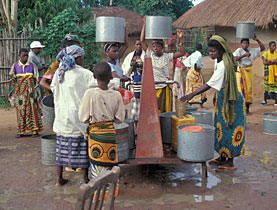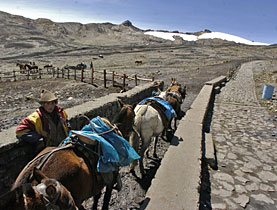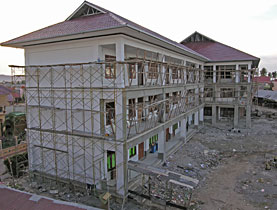Aid official urges greater solidarity

The outgoing head of the Swiss Agency for Development and Cooperation (SDC) has repeated his calls for greater solidarity regarding international aid cooperation.
Walter Fust, speaking at this year’s annual SDC conference in Zurich, also told swissinfo about Switzerland’s disaster relief achievements and the challenges for the future.
The 63-year-old ambassador, who steps down from the SDC at the end of April, will take up his position as CEO of the Geneva-based Global Humanitarian Forum in May.
“Humanitarian aid has changed considerably,” Fust said on the sidelines of the conference. “The nature of interventions has changed. There are fewer conflicts between countries but more conflicts within countries – and exponentially more natural disasters.”
He said another change was the number of parties involved in international cooperation. “One positive development is that the international response system improved structurally, especially with the leadership of the UN and the ICRC [International Committee of the Red Cross] family.”
Fust stressed the importance of Switzerland’s position within the global context, where the demands for networking, coordination and targeted deployment of resources have dramatically intensified.
Switzerland, he said, had contributed a great deal in this respect – “human resources, strategy changes, the surge for innovative approaches” – and would continue to do so in the future.
Major challenges
Among the major persisting problems hampering international cooperation, Fust included the issues of insufficient water supplies, climate change and the destruction of biological diversity.
“Worldwide, some 80 countries are confronted with a gravely serious lack of water,” he said, pointing out that the number of humans on the planet was increasing by one billion every decade, and that the world community would have to somehow find ways to feed them all.
“This challenge can effectively be met solely by means of targeted international solidarity,” he said.
Fust said another significant issue was fostering respect for recognised humanitarian principles.
“The long, drawn-out conflicts in Palestine, Darfur, and Sri Lanka are still in search of a solution that will bring the peace so longed for by the oppressed civilian populations.”
Secrets of success
swissinfo also spoke to Toni Frisch, head of the Swiss Humanitarian Aid Unit at the SDC, who felt one challenge to be addressed was the risk that humanitarian aid was being politicised.
“Humanitarian aid principles – independence, neutrality, impartiality and working without political conditions – are increasingly being lost,” he said.
Explaining the secrets of successful humanitarian aid, Frisch said: “We have to be rapid in reaction. We have to be flexible, open-minded, focused and effective.”
“We always do that in very close cooperation with the local bodies and governments. We do not want to be parachuted somewhere and do our job just for us. We want to be part of a broader humanitarian family with our partners on the spot,” he added.
Frisch said that they also wanted to come to the aid of Swiss citizens who found themselves in distress abroad following a crisis or a disaster.
This latter task, he said, had been officially enshrined in the latest draft law on humanitarian aid.
swissinfo, Thomas Stephens in Zurich
The Swiss Humanitarian Aid Unit – a part of the Swiss Agency for Development and Cooperation (SDC) – aims to save lives and alleviate suffering.
It provides direct relief after natural disasters and during emergencies arising from conflicts.
Prevention, emergency aid, reconstruction and advocacy are the four most important areas in which humanitarian aid is active.
All humanitarian aid actions and programmes take into account environmental aspects, gender-related social questions, human rights and government leadership. They include medium- and long-term considerations and work is coordinated with other measures such as development cooperation.
The SDC employs a staff of about 550 and has an annual budget of SFr1.3 billion.
The Humanitarian Aid Unit has an annual budget of about SFr280 million ($282 million).
It spends about a third of this to finance its own direct activities and those of Swiss non-governmental organisations abroad.
The other two-thirds are used for cooperation with international organisations, including projects of the United Nations and the Red Cross.

In compliance with the JTI standards
More: SWI swissinfo.ch certified by the Journalism Trust Initiative













You can find an overview of ongoing debates with our journalists here . Please join us!
If you want to start a conversation about a topic raised in this article or want to report factual errors, email us at english@swissinfo.ch.